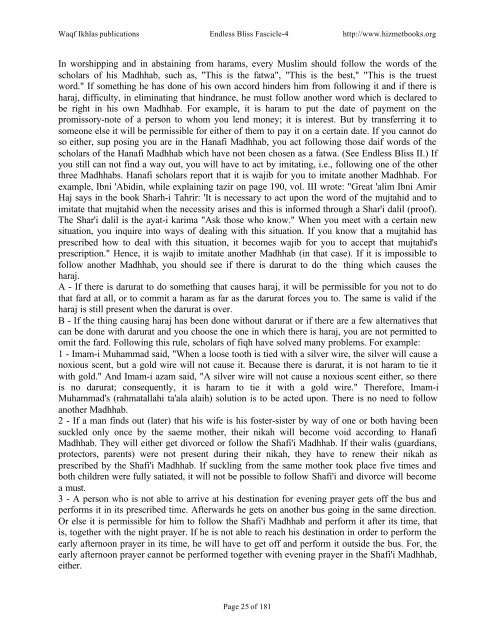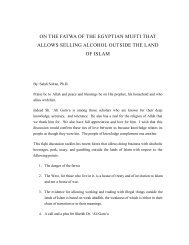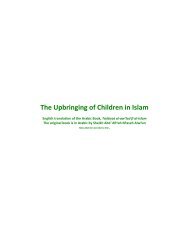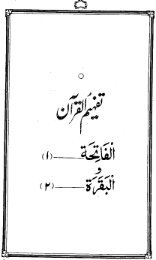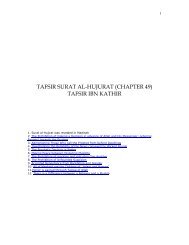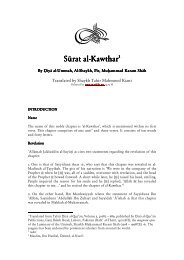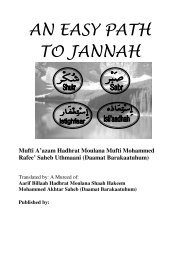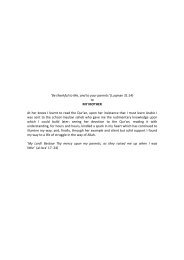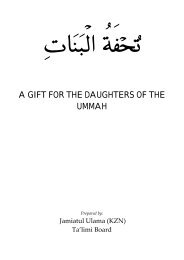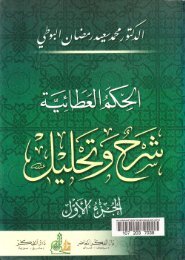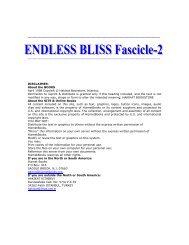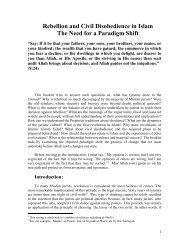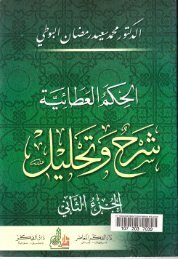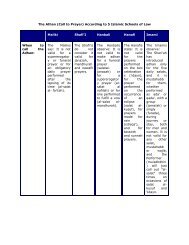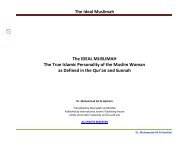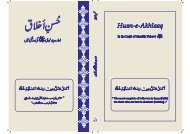ENDLESS BLISS FASCICLE-4
ENDLESS BLISS FASCICLE-4
ENDLESS BLISS FASCICLE-4
Create successful ePaper yourself
Turn your PDF publications into a flip-book with our unique Google optimized e-Paper software.
Waqf Ikhlas publications Endless Bliss Fascicle-4 http://www.hizmetbooks.org<br />
In worshipping and in abstaining from harams, every Muslim should follow the words of the<br />
scholars of his Madhhab, such as, "This is the fatwa", "This is the best," "This is the truest<br />
word." If something he has done of his own accord hinders him from following it and if there is<br />
haraj, difficulty, in eliminating that hindrance, he must follow another word which is declared to<br />
be right in his own Madhhab. For example, it is haram to put the date of payment on the<br />
promissory-note of a person to whom you lend money; it is interest. But by transferring it to<br />
someone else it will be permissible for either of them to pay it on a certain date. If you cannot do<br />
so either, sup posing you are in the Hanafi Madhhab, you act following those daif words of the<br />
scholars of the Hanafi Madhhab which have not been chosen as a fatwa. (See Endless Bliss II.) If<br />
you still can not find a way out, you will have to act by imitating, i.e., following one of the other<br />
three Madhhabs. Hanafi scholars report that it is wajib for you to imitate another Madhhab. For<br />
example, Ibni 'Abidin, while explaining tazir on page 190, vol. III wrote: "Great 'alim Ibni Amir<br />
Haj says in the book Sharh-i Tahrir: 'It is necessary to act upon the word of the mujtahid and to<br />
imitate that mujtahid when the necessity arises and this is informed through a Shar'i dalil (proof).<br />
The Shar'i dalil is the ayat-i karima "Ask those who know." When you meet with a certain new<br />
situation, you inquire into ways of dealing with this situation. If you know that a mujtahid has<br />
prescribed how to deal with this situation, it becomes wajib for you to accept that mujtahid's<br />
prescription." Hence, it is wajib to imitate another Madhhab (in that case). If it is impossible to<br />
follow another Madhhab, you should see if there is darurat to do the thing which causes the<br />
haraj.<br />
A - If there is darurat to do something that causes haraj, it will be permissible for you not to do<br />
that fard at all, or to commit a haram as far as the darurat forces you to. The same is valid if the<br />
haraj is still present when the darurat is over.<br />
B - If the thing causing haraj has been done without darurat or if there are a few alternatives that<br />
can be done with darurat and you choose the one in which there is haraj, you are not permitted to<br />
omit the fard. Following this rule, scholars of fiqh have solved many problems. For example:<br />
1 - Imam-i Muhammad said, "When a loose tooth is tied with a silver wire, the silver will cause a<br />
noxious scent, but a gold wire will not cause it. Because there is darurat, it is not haram to tie it<br />
with gold." And Imam-i azam said, "A silver wire will not cause a noxious scent either, so there<br />
is no darurat; consequently, it is haram to tie it with a gold wire." Therefore, Imam-i<br />
Muhammad's (rahmatallahi ta'ala alaih) solution is to be acted upon. There is no need to follow<br />
another Madhhab.<br />
2 - If a man finds out (later) that his wife is his foster-sister by way of one or both having been<br />
suckled only once by the saeme mother, their nikah will become void according to Hanafi<br />
Madhhab. They will either get divorced or follow the Shafi'i Madhhab. If their walis (guardians,<br />
protectors, parents) were not present during their nikah, they have to renew their nikah as<br />
prescribed by the Shafi'i Madhhab. If suckling from the same mother took place five times and<br />
both children were fully satiated, it will not be possible to follow Shafi'i and divorce will become<br />
a must.<br />
3 - A person who is not able to arrive at his destination for evening prayer gets off the bus and<br />
performs it in its prescribed time. Afterwards he gets on another bus going in the same direction.<br />
Or else it is permissible for him to follow the Shafi'i Madhhab and perform it after its time, that<br />
is, together with the night prayer. If he is not able to reach his destination in order to perform the<br />
early afternoon prayer in its time, he will have to get off and perform it outside the bus. For, the<br />
early afternoon prayer cannot be performed together with evening prayer in the Shafi'i Madhhab,<br />
either.<br />
Page 25 of 181


